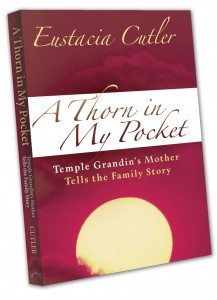
A Thorn in My Pocket: Temple Grandins Mother Tells the Family Story
Author: Eustacia Cutler
Publishing Info: October 2004
Reviewed by Maureen Bennie: Director, Autism Awareness Centre Inc.
The role of mother is a complex one laced with emotion, struggles, happiness and disappointment. The journey of mothering a child with an autism spectrum disorder is a road full of trials, guilt, quests and fear of the unknown. Most mothers of ASD children share similar experiences and feelings no matter what their age or background. Eustacia Cutler, mother of Temple Grandin (arguably the most famous woman in the world with autism) takes us through her personal journey of raising a daughter with autism during a time where little was known about the disorder. Ms. Cutler shares with us her self doubt and search for answers amidst an environment that offered little support.
Eustacia Cutler was a pioneer, someone who did everything she could to help Temple be the best she could be. We realize her struggles are the same as mothers today yet she has certain experiences that are unique to her era. She was often the victim of social conventions of the time. Children with disabilities were institutionalized rather than raised by their families. There were no available therapy programs. Inclusion was not a word used by educators. Ms. Cutler makes us aware of how far we’ve come with research, diagnosis, and inclusive education for those with ASD’s.
Women do not often reveal their turmoil on the home front because of shame and guilt. We have a friend in Eustacia Cutler because she is open about the problems in her marriage to Dick Grandin. Dick pressured Eustacia to put Temple into an institution because of her difficult behavior. Readers may be surprised to hear that Temple was once a fecal smearer and engaged in destructive behavior.
Dick Grandin couldn’t accept his daughter and frequently tormented her. The irony of the situation was what Dick hated in Temple were the traits he possessed. We grow to hate Dick for his cruel and unfair treatment of his wife and daughter, his lack of empathy and his absence of support.
Eustacia realized early in her marriage that she had to save herself from despair and the harsh judgment of her husband. She discovered singing and acting and those outlets became a temporary means of escape. Every mother needs something just for themselves, something they look forward to that is just theirs. It frees one from the confines of family but it is for the good of the family that a mother needs to do it. Eustacia sang to survive.
Eustacia faced tough barriers. She searched for good schools for Temple, looked for new therapies, wanted inclusion for Temple in neighborhood activities, lost her singing career for several years due to a throat condition, and battled a husband who kept notes on her every move for three years. Dick later presented the notebook to their psychiatrist to get his wife committed for insanity. This was the turning point in their marriage. She left after the psychiatrist revealed what her husband was trying to do. We applaud and cheer for her freedom which also brought on financial hardship. Today parents of children with autism have one of the highest divorce rates.
Throughout Eustacia’s story is the never ending will to survive and do the best for her children. She is the mother of four but Temple is the only child mentioned by name because the other children requested they not be named. Eustacia does make reference to their hardships of having a sibling with autism which created an unusual family dynamic.
There is value in reading about the theories and thoughts of a bygone era around autism. Parents now on this journey can thank mothers like Eustacia who lobbied for change and fought archaic attitudes. Eustacia was part of that movement in her on-going quest to find information about autism long before the internet era.
What is universal about this book is the feelings around the autism experience which haven’t changed much over the years. Yes, there are better therapies, rights and improved knowledge but there are still unanswered questions and no cure. Every mother grieves about a diagnosis, searches for answers, and tries to do the best for her children. By reading Eustacia Cutler’s story, we have a friend, a person who inspires us, and someone who lets us know we can never know what our children will become. Temple exceeded her wildest expectations. Her pride in Temple radiates throughout the book. Parents, educators, family members, and therapists will get an insider look at one mother’s story which is the same for all of us – finding the best outcome for the child with autism. Thank you for giving us a glimpse of your journey, Eustacia.
Visit our Bookstore to purchase A Thorn in My Pocket: Temple Grandin’s Mother Tells the Family Story.
Editorial Policy: Autism Awareness Centre believes that education is the key to success in assisting individuals who have autism and related disorders. Autism Awareness Centre’s mission is to ensure our extensive autism resource selection features the newest titles available in North America. Note that the information contained on this web site should not be used as a substitute for medical care and advice.
